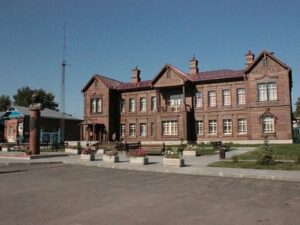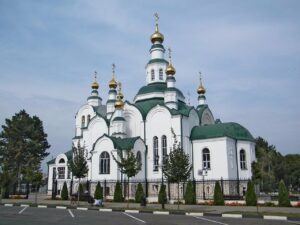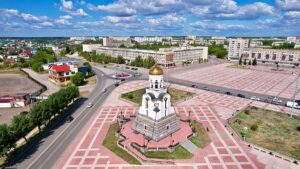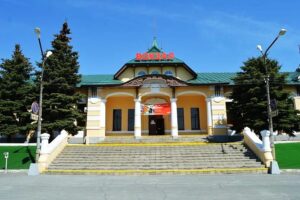Lviv, Ukraine: Exploring the Cultural Heart of Western Ukraine

Young ukranian girl model friends walking at park of lviv ukraine
Introduction
Lviv, located in western Ukraine, is a city steeped in history, culture, and architectural beauty. Known for its well-preserved medieval and baroque architecture, vibrant cultural scene, and rich cultural heritage, Lviv has earned a reputation as one of Eastern Europe’s most enchanting and historically significant cities. This article delves deep into Lviv’s historical evolution, architectural wonders, cultural attractions, culinary delights, and more.
Historical Overview
Medieval Origins
Lviv’s history dates back to the 13th century when it was founded by King Danylo Halytskyi of Ruthenia, making it one of the oldest cities in Ukraine. The city quickly became a bustling trade center on the crossroads of East and West, benefiting from its strategic location along trade routes linking Europe with the Byzantine Empire and Asia. Lviv’s medieval past is reflected in its Gothic architecture, fortifications, and cultural diversity influenced by Polish, Ukrainian, Armenian, Jewish, and German communities.
Polish-Lithuanian Commonwealth and Habsburg Rule
During the 14th to 17th centuries, Lviv flourished under the Polish-Lithuanian Commonwealth, becoming a leading cultural and economic hub in Eastern Europe. The city’s prosperity attracted merchants, craftsmen, and scholars, contributing to its architectural splendor and intellectual vibrancy. In the late 18th century, Lviv came under Habsburg rule following the partitions of Poland, marking a period of Austrian influence that shaped Lviv’s baroque and neoclassical architecture, public squares, and urban planning.
Interwar Period and Soviet Era
Lviv experienced political and demographic shifts during the 20th century, alternating between Polish and Soviet rule amid territorial changes and conflicts. Following World War II, Lviv became part of the Ukrainian Soviet Socialist Republic within the Soviet Union, leading to industrialization, urban expansion, and cultural assimilation. Despite political upheavals and social transformations, Lviv retained its cultural identity, architectural heritage, and resilience amid historical challenges.
Post-Soviet Independence and European Integration
Since Ukraine’s independence in 1991, Lviv has embraced democratic reforms, economic development, and cultural revival, reaffirming its status as a cultural capital in Eastern Europe. The city’s integration into European networks, tourism growth, and preservation of historical landmarks underscore Lviv’s role as a bridge between East and West, promoting cross-cultural dialogue, artistic exchange, and international cooperation.
Architectural Wonders
Old Town (Rynok Square and Surroundings)
Lviv’s Old Town, a UNESCO World Heritage site, is a maze of cobblestone streets, colorful facades, and architectural landmarks that showcase its medieval and baroque heritage. Highlights include:
- Rynok Square: The central square of Lviv, featuring Renaissance-style buildings, outdoor cafés, and the Town Hall (Ratusha) with panoramic views from its tower.
- Armenian Cathedral: A 14th-century cathedral renowned for its Armenian apostolic architecture, decorative carvings, and religious artifacts.
- Latin Cathedral: A Gothic cathedral dating back to the 14th century, known for its stained glass windows, historic organ, and religious iconography.
Lviv High Castle (Vysokyi Zamok)
Lviv High Castle, located on Castle Hill overlooking the city, offers panoramic views of Lviv’s skyline, historic districts, and surrounding landscapes. The castle’s ruins and observation deck provide insights into Lviv’s medieval fortifications, strategic defenses, and cultural significance as a symbol of resilience and historical continuity.
Lviv Opera House (Solomiya Krushelnytska Opera House)
Lviv Opera House is a cultural landmark renowned for its architectural grandeur, acoustics, and artistic performances. Built in the neo-Renaissance style in the late 19th century, the opera house hosts opera, ballet, and classical music concerts that showcase Lviv’s artistic heritage and cultural diversity. The opera house’s interior features ornate decorations, chandeliers, and a majestic auditorium that captivate audiences and artists alike.
Lychakiv Cemetery
Lychakiv Cemetery is a historic necropolis and open-air museum that preserves Lviv’s cultural and intellectual heritage through its elaborate tombs, monuments, and burial chapels. The cemetery’s landscaped grounds, sculptures, and funerary art reflect various architectural styles and cultural influences, including Gothic, Renaissance, and Art Nouveau. Lychakiv Cemetery is a testament to Lviv’s multicultural history, artistic craftsmanship, and commemoration of notable figures from Ukrainian and European history.
Cultural Institutions
Lviv National Art Gallery
Lviv National Art Gallery, housed in the Potocki Palace and other historic buildings, is one of Ukraine’s largest art museums. The gallery’s collections span Ukrainian, European, and international art from antiquity to the modern era, featuring paintings, sculptures, decorative arts, and temporary exhibitions. Lviv National Art Gallery promotes cultural exchange, artistic innovation, and public engagement through educational programs, workshops, and scholarly research.
Lviv Historical Museum
Lviv Historical Museum is dedicated to preserving Lviv’s history, archaeology, and cultural heritage through its collections of artifacts, documents, and multimedia exhibits. The museum’s exhibitions explore Lviv’s medieval origins, urban development, and historical events that shaped the city’s identity and architectural landscape. Lviv Historical Museum offers guided tours, lectures, and outreach programs that promote historical literacy and civic engagement among visitors and local communities.
Lviv Theatre of Opera and Ballet
Lviv Theatre of Opera and Ballet, also known as Solomiya Krushelnytska Opera House, is a cultural institution that showcases opera, ballet, and performing arts in Lviv’s historic center. The theater’s repertoire includes Ukrainian and international productions, featuring renowned artists, conductors, and choreographers who contribute to Lviv’s artistic legacy and cultural vitality. Lviv Theatre of Opera and Ballet fosters artistic excellence, audience engagement, and cultural diplomacy through its performances and educational initiatives.
Festivals and Events
Lviv International Book Forum
Lviv International Book Forum is an annual literary event that celebrates Ukrainian and international literature through book presentations, author readings, panel discussions, and cultural activities. The forum promotes literary diversity, intellectual discourse, and creative expression among writers, publishers, and book enthusiasts from Ukraine and abroad. Lviv International Book Forum fosters a vibrant literary community, supports emerging authors, and promotes Lviv as a UNESCO City of Literature.
Lviv Jazz Fest
Lviv Jazz Fest is a renowned music festival that showcases jazz performances by Ukrainian and international musicians in Lviv’s historic venues, outdoor stages, and cultural spaces. The festival’s program includes concerts, jam sessions, workshops, and educational programs that celebrate jazz music’s improvisational spirit, cultural diversity, and artistic innovation. Lviv Jazz Fest attracts jazz enthusiasts, music lovers, and tourists who gather to enjoy live performances and discover Lviv’s dynamic jazz scene.
Lviv Coffee Festival
Lviv Coffee Festival is a popular cultural event that celebrates Lviv’s coffee culture, culinary traditions, and historical cafes. The festival features coffee tastings, barista competitions, workshops, and cultural activities held in Lviv’s Old Town squares, cafes, and coffeehouses. Lviv Coffee Festival highlights the city’s reputation as a UNESCO City of Gastronomy, promoting sustainable coffee production, artisanal roasting techniques, and coffee tourism experiences in Lviv and beyond.
Culinary Delights
Lviv Cuisine
Lviv’s culinary scene reflects its multicultural heritage and culinary traditions influenced by Ukrainian, Polish, Jewish, and Austrian cuisines. Popular specialties include:
- Galician Borsch: Beetroot soup with vegetables and sour cream, served with savory pastries or dumplings.
- Varenyky: Dumplings stuffed with potatoes, cheese, or meat, often served with fried onions and sour cream.
- Lviv Cheesecake: A sweet dessert made with farmer’s cheese, raisins, and served with fruit preserves or honey.
Lviv Chocolate Workshop
Lviv is renowned for its chocolate-making tradition and artisanal confectionery. Visitors can participate in chocolate workshops, tastings, and tours of Lviv’s chocolate factories and cafes. Lviv Chocolate Workshop offers hands-on experiences where participants learn about chocolate production techniques, tempering, and decorating chocolate creations. The workshop promotes Lviv’s reputation as a UNESCO City of Gastronomy and a destination for chocolate enthusiasts seeking authentic culinary experiences.
Lviv Craft Beer Scene
Lviv’s craft beer scene has gained popularity among locals and tourists, with breweries, pubs, and beer halls offering a wide selection of artisanal beers and brewing styles. Visitors can sample locally brewed beers, attend beer tastings, and explore Lviv’s beer culture through brewery tours and pub crawls. Lviv Craft Beer Scene showcases innovative brewing techniques, seasonal beer festivals, and community events that celebrate Lviv’s brewing heritage and beer-making traditions.
Modern Lviv
Sustainable Tourism Initiatives
Lviv is committed to sustainable tourism practices, environmental conservation, and cultural preservation, promoting eco-friendly accommodations, waste reduction programs, and renewable energy initiatives. The city’s cultural institutions, tour operators, and local businesses offer guided tours, workshops, and educational programs that highlight Lviv’s cultural heritage, natural landscapes, and sustainable development initiatives.
Artisan Workshops and Creative Industries
Lviv’s artisan workshops, creative industries, and cultural initiatives contribute to the city’s artistic vibrancy, economic growth, and community engagement. Visitors can explore pottery studios, textile workshops, and art galleries showcasing traditional craftsmanship and contemporary artistry. Lviv’s creative industries support local artisans, designers, and entrepreneurs who contribute to Lviv’s cultural identity, artistic innovation, and cultural tourism experiences.
Shopping and Souvenirs
Lviv’s historic center and marketplaces offer a variety of artisanal shops, boutiques, and galleries selling handmade souvenirs and gifts. Popular souvenirs include embroidered textiles, ceramics, wooden carvings, and traditional Ukrainian crafts. Visitors can explore Lviv’s narrow streets, pedestrian zones, and market squares to discover unique treasures that celebrate Lviv’s cultural heritage, artistic craftsmanship, and creative industries.
Educational and Cultural Institutions
Lviv Polytechnic National University
Lviv Polytechnic National University is one of Ukraine’s leading technical universities, offering undergraduate and graduate programs in engineering, sciences, architecture, and humanities. The university promotes academic excellence, research innovation, and international cooperation through partnerships with academic institutions, industry leaders, and research organizations. Lviv Polytechnic National University contributes to Lviv’s intellectual capital, technological advancements, and educational opportunities for students and scholars.
Lviv National University
Lviv National University, named after Ivan Franko, is a prominent educational institution that offers programs in humanities, social sciences, natural sciences, and economics. The university’s faculties and research centers promote interdisciplinary studies, cultural exchange, and academic collaboration among students, faculty, and international scholars. Lviv National University fosters intellectual growth, critical thinking, and cultural awareness through its educational programs, research initiatives, and community outreach activities.
Getting Around Lviv
Walking Tours
Lviv’s historic center and surrounding neighborhoods are best explored on foot, with guided walking tours offering insights into the city’s architecture, cultural landmarks, and hidden gems. Walking paths and pedestrian zones connect Lviv’s historic squares, museums, and scenic viewpoints, providing opportunities for leisurely exploration, photography, and cultural immersion. Guided tours provide historical context and local perspectives on Lviv’s medieval past, baroque architecture, and contemporary cultural vitality.
Public Transportation
Lviv’s public transportation system includes trams, buses, and trolleybuses that provide convenient travel options within the city and to suburban areas. Tram routes connect Lviv’s central railway station with cultural attractions, residential neighborhoods, and recreational parks, offering affordable and accessible transportation for residents and visitors. Public transportation services promote sustainable mobility, urban connectivity, and tourism opportunities in Lviv and the surrounding region.
Cycling Routes
Lviv is developing cycling routes, bike lanes, and bike-sharing programs that encourage eco-friendly transportation and outdoor recreation. Cyclists can explore Lviv’s historic districts, parks, and scenic routes on designated bike paths that connect urban areas with rural landscapes. Bike rentals, guided cycling tours, and cycling events promote active lifestyles, environmental awareness, and tourism experiences that showcase Lviv’s cultural heritage and natural beauty.
Conclusion
Lviv, with its medieval charm, cultural diversity, and artistic vitality, offers visitors an immersive journey through Ukraine’s cultural and architectural treasures. Whether exploring historic landmarks, savoring traditional cuisine, or attending cultural festivals, visitors are captivated by Lviv’s rich history, artistic heritage, and vibrant community spirit. Lviv’s commitment to sustainable tourism, cultural preservation, and international cooperation underscores its significance as a UNESCO World Heritage site and a gateway to Eastern Europe’s cultural capital. Embark on an unforgettable adventure to Lviv, where every street corner tells a story of resilience, creativity, and the timeless allure of Ukraine’s cultural heartland.




